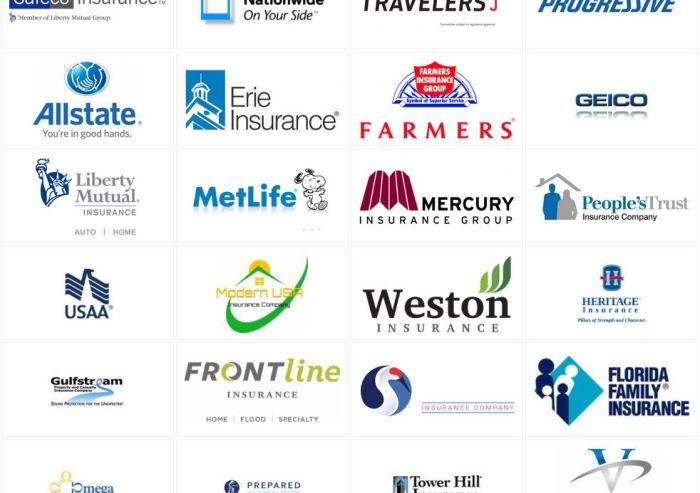Florida car insurance is a crucial aspect of driving in the Sunshine State, providing protection and peace of mind to motorists. This guide delves into the intricacies of Florida car insurance, exploring the market landscape, regulations, coverage options, and more, empowering you to make informed decisions and safeguard your financial well-being.
From understanding the state’s unique regulations to navigating the complexities of coverage types, this comprehensive resource provides invaluable insights into the world of Florida car insurance.
Overview of Florida Car Insurance Market
The Florida car insurance market is a large and growing one, with over $10 billion in premiums written in 2020. The market is dominated by a few large insurers, including State Farm, GEICO, and Progressive.
The key factors driving the growth of the Florida car insurance market include population growth and tourism. The state’s population is growing rapidly, and the number of tourists visiting Florida each year is also increasing.
This growth is leading to more cars on the road, which in turn is leading to more accidents and more demand for car insurance.
Major Players and Market Share
- State Farm: 20%
- GEICO: 15%
- Progressive: 10%
- Allstate: 8%
- Farmers: 5%
Florida Car Insurance Regulations
Car insurance is regulated by the state of Florida. The state requires all drivers to carry a minimum amount of liability insurance. The minimum coverage requirements are:
- $10,000 for property damage
- $20,000 for bodily injury per person
- $40,000 for bodily injury per accident
Drivers who fail to carry the minimum amount of insurance can be fined and have their license suspended.
Florida Insurance Guaranty Association (FIGA)
The Florida Insurance Guaranty Association (FIGA) is a state-created entity that provides coverage to policyholders of insolvent insurance companies. If an insurance company becomes insolvent, FIGA will step in and pay claims up to the limits of the policy.
Types of Florida Car Insurance Coverage
There are a variety of different types of car insurance coverage available in Florida. The most common types of coverage include:
- Liability insurance: This coverage pays for damages to other people or their property if you are at fault for an accident.
- Collision insurance: This coverage pays for damages to your own car if you are involved in an accident.
- Comprehensive insurance: This coverage pays for damages to your car caused by events other than accidents, such as theft, vandalism, or fire.
You can also purchase additional coverage, such as:
- Uninsured/underinsured motorist coverage: This coverage pays for damages if you are hit by a driver who does not have insurance or who does not have enough insurance.
- Medical payments coverage: This coverage pays for medical expenses for you and your passengers if you are injured in an accident.
- Rental car reimbursement coverage: This coverage pays for a rental car if your car is damaged in an accident.
Factors Affecting Florida Car Insurance Rates
The cost of car insurance in Florida is affected by a number of factors, including:
- Driving history: Drivers with a clean driving record will pay lower rates than drivers with a history of accidents or traffic violations.
- Age: Younger drivers typically pay higher rates than older drivers.
- Location: Drivers who live in urban areas typically pay higher rates than drivers who live in rural areas.
- Type of car: The type of car you drive can also affect your rates. Sports cars and luxury cars typically cost more to insure than sedans and minivans.
- Coverage limits: The higher your coverage limits, the higher your rates will be.
Shopping for Florida Car Insurance

There are a number of ways to shop for car insurance in Florida. You can get quotes from insurance companies online, over the phone, or through an insurance agent.
When you are shopping for car insurance, it is important to compare quotes from multiple insurance companies. This will help you find the best rate for the coverage you need.
Tips for Comparing Quotes, Florida car insurance

-
- Make sure you are comparing apples to apples. Get quotes for the same coverage limits from each insurance company.
- Consider the financial strength of the insurance company. You want to make sure that the insurance company you choose will be able to pay your claims if you need them.
- Read the policy carefully before you buy it. Make sure you understand what is covered and what is not.
Filing a Florida Car Insurance Claim
If you are involved in an accident, you should file a claim with your insurance company as soon as possible. You can file a claim online, over the phone, or through your insurance agent.
When you file a claim, you will need to provide the insurance company with information about the accident, including:
-
-
- The date, time, and location of the accident
- The names and contact information of the other drivers involved in the accident
- The make, model, and year of your car
- The damage to your car
-
The insurance company will investigate your claim and determine how much you are entitled to receive. You will typically receive a check for the amount of your claim within a few weeks.
If you’re looking for the best car insurance rates in Florida, you should consider using a car insurance broker. A broker can help you compare quotes from multiple insurance companies to find the best deal for your needs.
They can also help you understand the different types of coverage available and make sure you’re getting the right coverage for your car and your budget.
Florida car insurance rates can vary significantly depending on a number of factors, including your age, driving history, and the type of car you drive. A broker can help you find the best rates for your specific situation.
Florida Car Insurance Fraud
Car insurance fraud is a serious problem in Florida. Fraudulent claims cost insurance companies billions of dollars each year. There are a number of different types of car insurance fraud, including:
-
-
- Filing a false claim
- Exaggerating the extent of damages
- Staging an accident
- Using a stolen car to file a claim
-
Car insurance fraud is a crime. If you are convicted of insurance fraud, you could face fines, jail time, and loss of your driver’s license.
Florida car insurance is a necessity for any driver in the Sunshine State. With its high number of tourists and year-round sunshine, the roads can be busy and dangerous. That’s why it’s important to have adequate coverage in case of an accident.
One option to consider is triple car insurance. This type of policy provides three times the coverage of a standard policy, which can give you peace of mind knowing that you’re fully protected in the event of an accident.
How to Report Suspected Fraud
If you suspect that someone is committing car insurance fraud, you can report it to the Florida Department of Insurance. You can file a report online or by calling 1-800-342-2762.
Florida car insurance rates can vary significantly, so it’s important to compare quotes from multiple car insurance agencies. These agencies can help you find the right coverage at the right price, ensuring that you’re protected in the event of an accident.
Remember to consider factors such as your driving history, vehicle type, and coverage needs when choosing an insurance policy.
Summary
In the realm of Florida car insurance, knowledge is power. By arming yourself with the information presented in this guide, you can confidently navigate the insurance landscape, choose the coverage that best suits your needs, and protect yourself against unforeseen circumstances. Remember, Florida car insurance is not just a legal requirement; it’s an investment in your financial security and peace of mind.
FAQ Guide
What are the minimum coverage requirements for Florida car insurance?
Florida law requires all drivers to carry a minimum of $10,000 in personal injury protection (PIP) and $10,000 in property damage liability (PDL) coverage.
How can I lower my Florida car insurance rates?
Maintaining a clean driving record, taking defensive driving courses, and increasing your deductible can help reduce your premiums.
What should I do after a car accident in Florida?
Immediately report the accident to your insurance company and exchange information with the other driver(s) involved. Take photos of the damage and any injuries, and seek medical attention if necessary.




